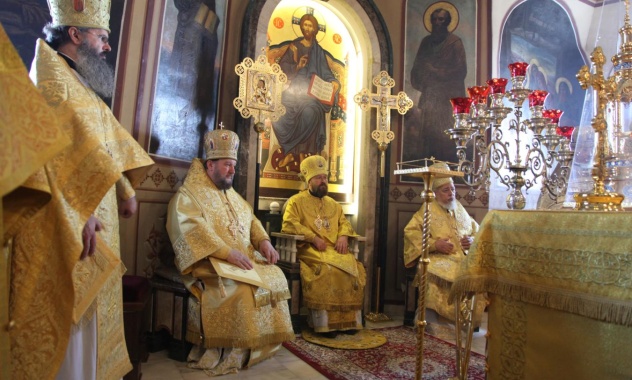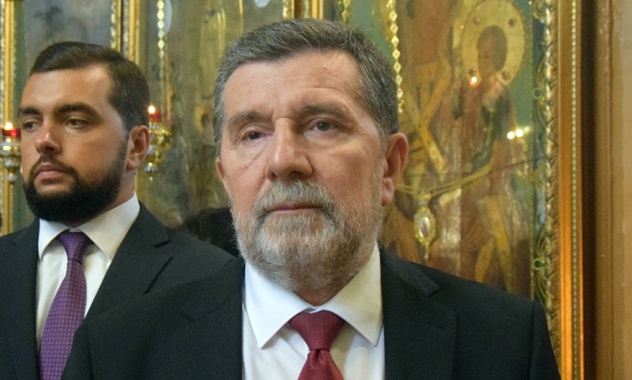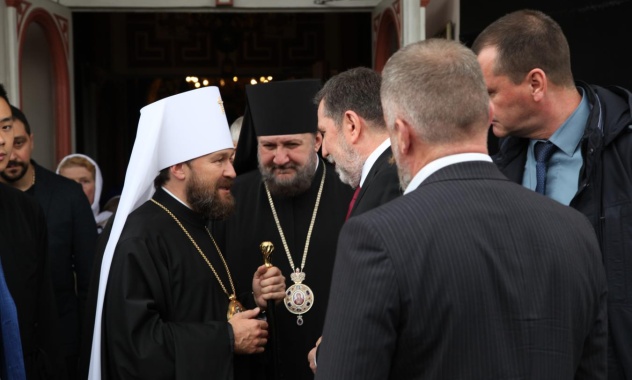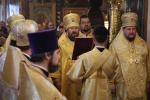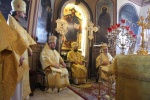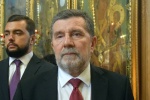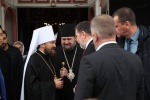Metropolitan Hilarion celebrates the Divine Liturgy at the Moscow representation of the Serbian Orthodox Church
On July 12, 2019, the commemoration day of Ss Peter and Paul, Metropolitan Hilarion, Chairman of the Moscow Patriarchate’s Department for External Church Relations (DECR), celebrated the Divine Liturgy at the Moscow representation of the Serbian Orthodox Church at the St. Peter Church-on-the Yauza River.
Vladyka Hilarion was joined by the Metropolitan Niphon of Philippopolis, representative of the Patriarch of Antioch to the Patriarch of Moscow and All Russia, Bishop Antonije of Moravici, representative of the Patriarch of Serbia to the Patriarch of Moscow and All Russia, Archpriest Nikolay Balashov, vice-chairman of the Moscow Patriarchate department for external church relations, Archpriest Daniel Andrejuk, representative of the Orthodox Church in America to the Patriarch of Moscow and All Russia, Archpriest Kakhaber Gogotishvili (Georgian Orthodox Church), Archpriest Igor Yakimchuk, DECR secretary for inter-Orthodox relations, Archpriest Sergei Gutenko (Ukrainian Orthodox Church), cleric of the St. Peter Church-on-the Yauza River Archimandrite Alexander (Kotov), dean of the Church of Nativity of Most Holy Mother of God in Feldkirch (Austria) Priest Nikola Balovic (Serbian Orthodox Church), and other members of clergy of the St. Peter church.
The Extraordinary and Plenipotentiary Ambassador of Serbia to Russia Slavenko Terzic and Orthodox pilgrims from Serbia also prayed at the service.
Present at the Liturgy was the delegation of the Roman-Catholic foundation “Urbi et Orbi”.
After the Prayer of Fervent Supplication, Metropolitan Hilarion lifted up a prayer for peace in Ukraine.
At the end of the Liturgy and moleben, the Bishop Antonije of Moravici noted: “Our church is a connecting bridge between the Serbian and Russian Orthodox Churches. This is evidenced by the presence of the Chairman of the Moscow Patriarchate’s Department for External Church Relations Metropolitan Hilarion of Volokolamsk, who prays with us today for all the Orthodox Christians in the world, and especially for the Russian and Serbian nations. ” In memory of the celebrated Divine Liturgy, Bishop Antonije presented the head of the DECR with an icon of the Chief Apostles Peter and Paul.
Metropolitan Hilarion addressed the congregation with a sermon: “Today, the Church commemorates the holy Apostles Peter and Paul. They are called ‘Chief Apostles’, and we often see their images at the right hand and at the left hand of our Lord Jesus Christ.
They had a very different fate. We hear a lot about the holy Apostle Peter in the Gospels. It is not only that all four Gospels mention him, but they also contain episodes from his life, describing how he reacted to the words and deeds of his Teacher – the Lord Jesus Christ. In today’s Gospel reading, we heard that when the Lord asked, “Who do people say that I am?”, His disciples answered: “Some say Elijah; others say Jeremiah or one of the prophets.” So when the Lord asked them directly: “But who do you say that I am?”, it was only Peter – because he alone believed at the time or because he spoke on behalf of the whole group – who answered and said: “You are the Christ, the Son of the living God.”
And the Lord replied to him, saying: “Blessed are you, Simon son of Jonah, for this was not revealed to you by flesh and blood, but by My Father in heaven. And I tell you that you are Peter, and on this rock I will build my Church, and the gates of Hades will not overcome it. I will give you the keys of the kingdom of heaven; whatever you bind on earth will be bound in heaven, and whatever you loose on earth will be loosed in heaven.” (Matthew 16:17-19)
As we see, already during the earthly life of the Lord Jesus Christ, the holy Apostle Peter became the leader of twelve disciples. He was the chief Apostle of the group, and after the Lord Jesus Christ had resurrected and ascended to heaven, it was Peter who was destined to lead this community for some time.
It was Peter who, as we read in the book of the Acts of the Apostles, was the one to initiate the election of the twelfth Apostle to replace Judas the traitor who had fallen away. And under St. Peter’s chairmanship this election took place.
What is surprising is that we read about this election in the Book of Acts and we know who was elected – a man named Matthias – but this person is never again mentioned in this book; he was chosen, and he seemed to have disappeared. And a completely different person who was not a member of the Apostolic community, was not one of the twelve disciples of Christ, but who, moreover, was a persecutor of the Church, appears in the Book of Acts after several chapters. A young man, who was apparently ten to fifteen years younger than the other Apostles and differed from them in education and culture: they were mostly illiterate Galilean fishermen, while he was an educated person, an expert in the Law of Moses, who studied at the feet of the distinguished Rabbi Gamaliel.
It was this man who was called by the Lord to the apostleship in a miraculous way. He acquired letters against Christians in Damascus in order to organize the same kind of persecution that he had previously organized against the Jerusalem Christian community. When he was approaching Damascus (we know which place is associated with that amazing event), the Lord appeared to him and asked: “Saul, Saul, why do you persecute Me?” And the man said, “Who are You, Lord?” And the Lord answered, “I am Jesus, Whom you are persecuting (Acts 9. 5-6).
This epiphany was such a shock to Saul that he was completely reborn. He lost his physical sight for some time, but his spiritual eyes had opened. The Lord then sent one of His disciples to him so that he would be baptized and instructed in the basics of the Christian faith. And then, as the Apostle Paul himself said, without conferring with flesh and blood (Gal. 1.16), he went and began to preach the crucified and risen Christ.
His sermons were met with mistrust in the Apostolic community — no one could believe that a man who was yesterday a persecutor of Christianity had suddenly become an Apostle. So when Paul came to Jerusalem and tried to join the Apostolic community, they did not want to accept him, because they thought that he was willing to destroy the Church from within. Paul, however, continued his Apostolic ministry. He met with the Apostle Peter and they spent fifteen days together. We do not know what they were talking about, but one can imagine that the Apostle Peter was talking about Christ, and Paul seemed to have absorbed all these stories. However, he did not absorb them to simply retell to other people. He never just paraphrased what he heard from the Apostles, but always preached what he had received from the Lord Himself, as we learn from his Epistles. So when Paul heard Peter’s stories, he understood that Jesus Christ, who appeared to him on the way to Damascus, was not a mere man, but God Himself who became human.
The Apostle Paul was the first to realize the wonderful and tremendous fact that Jesus Christ is not one of the prophets, not Jeremiah or Elijah, but that He is the Incarnate Son of God. St. Paul is credited as being the person who created the Christian theology and reflected in theological terms and categories on the story recorded by the Evangelists.
Even before the Gospels were written, St. Paul began to send out his Epistles – to the Romans, Corinthians, Thessalonians, Galatians, Ephesians, Timothy, Titus, Hebrews. In these epistles, Paul did not just admonish the Christians of various cities, but created a theological system that was expressed it terms which would later be used by the Church and included in its theological dictionary once and for all. Without even realizing it, when we today are talking about Jesus Christ, we use the language created by Paul. When reading the liturgical prayers, especially the Liturgy of St. Basil the Great, we see that they are all woven from words and expressions borrowed from the Epistles of the Apostle Paul.
Surprisingly, during their lifetime the Apostles Peter and Paul were not close. We never read about them traveling or preaching together. Peter and John preached together for some time, they even performed miracles together. But Peter and Paul first met for fifteen days in Jerusalem, then in Antioch, where they had a conflict described in the book of Acts, and then apparently their paths diverged and, perhaps, never crossed again, because they preached in different parts of the world.
We know very little about where Peter went and preached, but we know very well where Paul travelled to share the Gospel. Open up any edition of the New Testament, published by the Publishing House of the Moscow Patriarchate, and at the end of the book you will find the map of St. Paul’s missionary travels. Look at this map, follow the travel routes – they are known today and people use them to travel, but if now we can overcome such distances in two or three hours by plane, the Apostle Paul had to cross those dusty roads on foot, and not in sports shoes, but in light sandals. He travelled tens, hundreds and thousands of kilometres to preach the crucified and risen Christ.
How did the Church mark his feat? He was not only added to number of the twelve Apostles, but was placed right next to Christ, just like St. Peter. The Church called Paul one of the two Chief Apostles. When we look at the icon of the Pentecost, we see that there are twelve Apostles depicted in it, and one of them is Paul, although, of course, he was not present there physically, for at that time he was still a persecutor of Christ’s Church. And when in ancient churches we see icons showing the Apostles having Communion, usually depicted in the Altar, we find st. Peter and five Apostles approaching the Lord from one side, and then st. Paul and five Apostles approaching Him from the other side. There is no depiction of Judas who was present at the Last Supper, nor of Matthias, who was elected to replace of Judas, but there is Paul, who joined the Apostolic community by the providence of God and who, as we heard in the Apostolic reading today, had himself said that he worked harder than others in preaching the Gospel of Christ.”
In memory of the joint prayer on the feast of Chief Apostles, the Chairman of the DECR presented Bishop Antonije with his two books on the biographies of the Apostles Peter and Paul. Metropolitan Hilarion emphasized that to this day the deeds of the holy Apostles continue to inspire Christians in their work and ministry.
Metropolitan also added that the Apostles Peter and Paul were the founders of the Church in Antioch. Welcoming the Metropolitan Niphon of Philippopolis, he said: “We are pleased to testify about our deep spiritual proximity and thank through you the Holy Church of Antioch for the constant support – the support which we also feel in the difficult issue of the Ukrainian schism and its legitimization by the Patriarch Bartholomew “.
“We also feel the support from the Holy Serbian Orthodox Church,” continued Vladyka Hilarion. – “As the Apostle Paul said, if one member of a body suffers, all members suffer together (1 Cor. 12.26). Likewise, when one Church faces tribulations, other Churches suffer together with it. ”
The Metropolitan stressed: “With great concern we are looking at what is happening in Montenegro where events are developing according to the scenario similar to what has happened in the Ukraine. The state authorities now proclaim that it is necessary to establish a Montenegrin church that would be independent from the Serbian Church. They have introduced a bill to nationalize all the churches built before 1918, with the goal, obviously, of transferring these churches – or some of them – to the schismatics. In general, everything that has already happened in Ukraine is happening now in Montenegro, and we see the sad outcome of this.” As Metropolitan Hilarion of Volokolamsk noted, a special statement was published at the meeting of the Holy Synod of the Russian Orthodox Church on July 9, 2019, in support of the Serbian Orthodox Church and all her believers living in Montenegro.
“We pray that the unity of the Serbian Church will be preserved and not shaken by anything,” said the DECR Chairman.
Addressing the Bishop Antonije of Moravici, representative of the Patriarch of Serbia to the Patriarch of Moscow and All Russia, Vladyka Hilarion wished him God’s help in his ministry.
“To all of you, dear fathers, brothers and sisters, I would like to wish God’s help in your labours. May the prayers of the Blessed Virgin Mary accompany us on our way, may the prayers and teachings of the holy Chief Apostles Peter and Paul help us to grow in the knowledge of our Lord Jesus Christ,” said Metropolitan Hilarion of Volokolamsk.
DECR Communication Service









